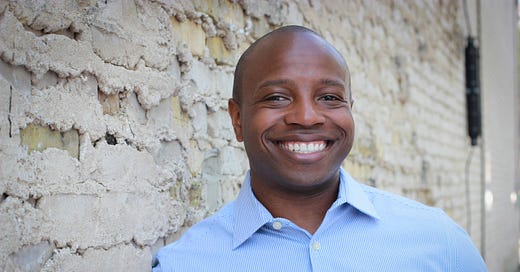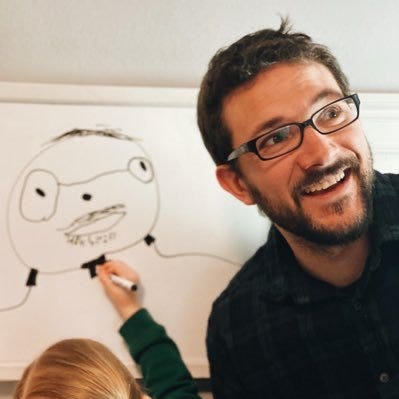Cavalier Johnson: 'I'm going to be the candidate in this race who is the proud urbanist'
In an interview with The Recombobulation Area, the acting mayor shared his urbanist vision for growth and for a "million people" in the city. Part of our coverage of the race for mayor in Milwaukee.
The Recombobulation Area is a weekly opinion column by veteran Milwaukee journalist Dan Shafer. Learn more about it here.
The City of Milwaukee is going to have an election for mayor. On February 15, we'll have a primary that could prove to be the most competitive mayoral primary in a generation.
Here at The Recombobulation Area, we’re going to be covering that election and getting into the issues. As part of that coverage, we are interviewing the candidates. Paid subscribers will be able to listen to full audio of those interviews and read a full transcript of what each candidate had to say.
In addition to those longer-form interviews, we’re also going to be featuring some of what candidates said during our interviews in breakout stories. The first of those is with Acting Mayor Cavalier Johnson, who talked about his vision for growth-minded urbanism in the city of Milwaukee.
Subscribers can access the full interview here.
Cavalier Johnson, the acting mayor of the city of Milwaukee, wants the city to grow.
“I want to bring vitality to Milwaukee,” he said in an interview with The Recombobulation Area. “I want this to be a city not just of 500,000 people or 577,000 people or even 600,000 people. I want this to be a city of a million people, or more. That's exactly what we should be working towards.”
Johnson wants to “think big” about the city’s future, and in doing so, is placing urbanism at the center of his vision for growth and development in Milwaukee.
“You gotta think boldly about transforming the city,” he said. “I'm going to be the candidate in this race who is the proud urbanist.”
Among those bold, urbanist ideas, he says, is removing highways.
“One of the things I think that I would really love to see in Milwaukee, and I'll be fighting for, is (tearing down) the spur between the Hoan Bridge and Marquette University and opening all that space up for development downtown,” he said, adding that he sees more perhaps even more potential for development there than what we’ve seen in the part of downtown where Fiserv Forum and the Deer District have been built.
Johnson also said he agrees with the proposal to tear down the Stadium Freeway – something we’ve advocated for here at The Recombobulation Area – and convert it to a boulevard.
“The more you're able to tear down those walls, (the more) you're able to bring people back together and recreate a sort of vibrancy,'' he said. “Creating a boulevard there I think helps with just that – reconnecting those neighborhoods with Washington Park, right across from that spur. There's a lot of things I think that we can do with respect to changing our infrastructure and making our communities whole again.”
Along with removing highways, Johnson wants to see investments in fixed-rail transit and protected bike lanes – and “not just bike lanes that are paint on the street,” he said – adding that he would prefer investments in public transportation to ones in highway expansion.
“If we expand the freeway, after a number of years, we're going to end up in the same position,” he said. “Expansion begets more car use. So you can expand (I-94), and then ten or perhaps 20 years later, if we're growing our population – not just in the city, like I want to do, but in the region and in the state – you're going to end up right back in the same situation. I don't want that to happen. What we really need to do is change the way that people get in and out of the city. We should be investing more in public transportation.”
While downtown might be the emphasis for a proposal like tearing down I-794, it’s not just downtown where Johnson sees possibility for the injection of urban ideas. He wants to see it throughout the city.
“I represented an aldermanic district before becoming mayor that is farther out from the more affluent, more prosperous neighborhoods – Bay View, Walker's Point, Downtown, East Side – and when you go farther out into the city farther north and farther west, there's a lot of opportunities that are left on the table,” he said. “And so, I tell developers constantly, hey, you're leaving opportunities here, you need to branch out, you need to get farther outside of the urban core, farther outside of those prosperous neighborhoods, and into the neighborhoods that have been challenged. Not just to provide jobs, but to provide that same sort of vitality and energy that we're talking about.”
Johnson said he would love to see more “urban plazas” in neighborhoods across the city, more gathering places in different neighborhoods, and sees these urbanist initiatives as a way to foster greater connections and development within the city.
“If development happens closer to home, then it provides job opportunities for the people who live nearby,” he said. “And if folks don't have to get to a car, then they're not going to suburban malls, they’re spending their dollars closer to home, which then provides additional opportunities for folks who live in inner city neighborhoods. That's the sort of direction that the mayor of Milwaukee needs to have. That's what I have.”
Part of that approach, he said – as part of his plan to curb reckless driving – is to address issues on state highways that go through the city of Milwaukee.
“When you see some of the most egregious reckless driving incidents, or accidents even, they happen on streets that are actually the jurisdiction of the state of Wisconsin Department of Transportation, these state highways that bisect our city like Capitol Drive or Appleton Avenue or Fond du Lac Avenue or National Avenue, and the like,” he said. “We need to work with our partners at the state and demand that they understand that when these state highways cut through Milwaukee, it's not the same as if they're cutting through Waukesha County, wide open fields. These are densely populated urban areas and neighborhoods and they can't operate the same way here as they do there.”
In short, he said, “I believe in the power of cities.”
For the full podcast version and transcript of our interview with Acting Mayor Cavalier Johnson, subscribe to The Recombobulation Area. Get started for just $5.
Stay tuned for more of our coverage on the race for mayor in Milwaukee.
Dan Shafer is a journalist from Milwaukee who writes and publishes The Recombobulation Area. He previously worked at Seattle Magazine, Seattle Business Magazine, the Milwaukee Business Journal, Milwaukee Magazine, and BizTimes Milwaukee. He’s also written for The Daily Beast, WisPolitics, and Milwaukee Record. He’s on Twitter at @DanRShafer.
Subscribe to The Recombobulation Area newsletter here and follow us on Facebook at @therecombobulationarea.
Follow Dan Shafer on Twitter at @DanRShafer.






Yeah lets take the freeway away and make it more difficult to get downtown. Those sound like dumb ideas. Rather than developing downtown, how about we focus on the north and south sides of Milwaukee. Develop those communities first.